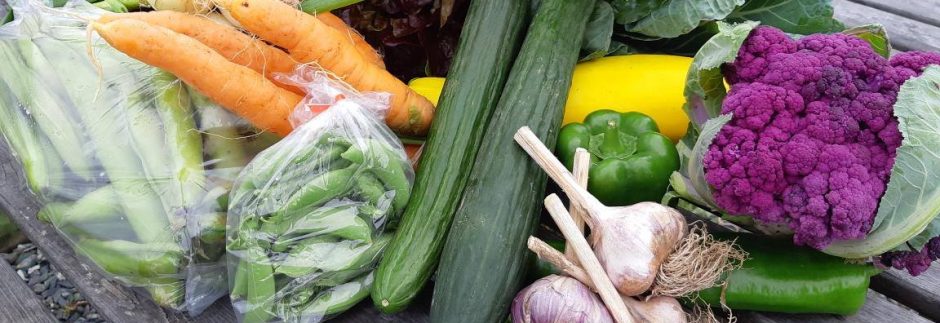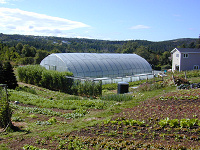Farm Notes – Week 8, August 11, 2013
CONTACT INFORMATION:
Coordinator: Mike Rabinowitz: House Phone: Before 5:30. 895-2884
Farm Cell: 6 – 6:30 p.m. 749-2884 (Please note number change for farm cell.)
Monday Pick-up went like clockwork. One of the smoothest in the twenty years of Veggie Coop. We were finished and ready to leave by 6:35. Wednesday didn’t go as well, but better than we thought since it was Regatta Day. If people were not able to make it, they wrote in advance saying they would pick up at the farm.
Poor Lost Squash.
When we were putting things away on Wednesday, we saw a green patti pan, nestled in the green grass, like a caterpillar on a leaf. We inspected it; it looked fine, but, who did it belong to? While Mike was writing the person we thought it belonged to, another member e-mailed us, to report a missing squash. We bring a packing slip to pick-up; if you have time, please take a couple of minutes to check your bag; if not, and you find something missing when you get home,, let us know. Satisfaction Is Guaranteed!
WHAT’S IN THE BAG?
Last week was one of the fullest bags ever in the history of the Veggie Coop, even when we were sharing with another farm. The weather has been especially agreeable for most crops and the new geo-thermal greenhouse is making a huge difference. The exception is the lettuce, which is either not growing or bolting and getting such in a matter of days. (No Salad Mix) . Lettuce thrives in colder weather. In fact, our first lettuce plants are often put outdoors in March, with patches of snow still on the ground. For other crops, this is only the beginning of things to come because the tomatoes, cucumbers are just beginning and if things go well, there will be lots of winter squash later in the fall.
The E-Mail Mike sent out at 2:21 this morning to organize picking tasks for staff when they arrived at the farm – basil, cabbage, fennel, garlic scapes, snow peas, hot pepper, string or runner beans, Swiss chard, Gooseberries, and a selection from a potpourri.( broccoli, cauliflower, cucumber or squash). For some veggies, we don’t know if we have sufficient quantities until staff pick on Monday. That’s why the packing slip is sometimes late getting posted. But, if he already knows he has sufficient quantities of some items, such as snow peas and beans, things are more quickly posted. We are good on the gooseberries because Soraya, the Agriculture Intern from France, helped son, Oz and daughter, Toby, pick over the week-end.
TAKING ADVANTAGE OF THE SWAP BOX
This set up is so Veggie Coop Members have some choices, around what they like and don’t like. If you have a vegetable in the bag that you don’t want, try to find something similar in price and swap. A lot of people seemed to be swapping fennel. That’s oik. with us. We do grow large quantities of things, such as fennel, so all of our members in both groups will have some, but, if you have tried fennel in a few ways and simply don’t like it, that’s cool. More than likely we will be able to sell l it to restaurants or at Farmers Market. However, if you just haven’t found a recipe that works, it might be worth some more investigation. The same is the case for Gooseberries. Thus, fennel and gooseberries will be the focus on farm notes this week.
SPECIAL ORDERS AND TAIL GATE SALES.
Mike started this idea a few years ago because when our members came to pick-up, they asked, do you have any more of this or more of that? This was especially true of things like tomatoes, snow peas and other things where the amounts in the bags are likely to fall short of the amount a growing family would eat in the course of the week. For example, I heard one Veggie Coop Member, order 4 pints of tomatoes as soon as we have sufficient quantities to sell. So, this would be a standing order. Another person, always takes as many packages of fava beans as we have available at pick-up. This same person orders artichoke each year, even though they are not even on the horizon yet.
If you want something special or additional of something you might normally get in the bag, e-mail Mike and he will bring it to Pick-Up with your name on it.
This from a Satisfied Customer.
“ Thank-you Mike and Melba for last week’s wonderful harvest. I fed 5 octogenarian ( and a number of less important people) what they kindly called a feast from your veggies. ( Fish with fennel, roasted summer squash, green salad, those beans, snow peas and gooseberry cake. The guest have gone home but my teens are clamoring for more gooseberry cake. May I purchase more gooseberries this week.”
Thanks, Marie.
USING THE GOOSEBERRIES.
The gooseberry cake that Marie refers to is the very last recipe in the Organic Farm Recipes. It only takes one or two cups of gooseberries and is also a favourite of mine.
The gooseberries may seem a little on the green side. There are two reasons for this. One is that when we try to do a large picking, with two or three pickers at one time, some areas in the patch are greener than others and the berries in lower parts of plant, tend to be greener than those on the upper branches where they get more sun. The second is that in general, restaurants prefer less ripe gooseberries, because they use the berries mainly for juicing to make a syrup to splash plate edges for a meat dish or to make gooseberry ice served as a pallet cleanser between courses.
No Need to Head and Tail the Gooseberries Unless You Are making pies.
I usually make the gooseberries into juice, which is easy to freeze and use in several ways over the winter. For example, Gooseberry Fool which is our favurite use was brought to our attention many years ago by Anita Best, who was the first coordinator of the Veggie Coop. This recipe is from the Friends of Garden Cookbook, Memorial University Botanical Garden and specifies hard green gooseberries. This recipe starts with 3 cups of berries and l/2 cup of sugar. And 5oz. Whipping Cream. Modify recipe according to quantities you have. Simmer gooseberries with sugar until quite soft. Sieve or blend them to puree. When the puree is cold, whip the whipping cream and stir it in. Add more sugar if needed. Serve very cold or freeze the Gooseberry Fool for at least 2 l/2 hours, stirring 2 to 3 times during freezing. I make gooseberry syrup and freeze in small or large quantities to make Gooseberry Fool long after gooseberry season is over. Last spring, I found some frozen gooseberry fool syrup and started adding it, fruit pies and apple crisps with great results. . .
THE FENNEL CHALLENGE.
Unlike asparagus which grows wild in Tennessee, fennel is a new vegetable to me. The faces of a few Veggie Coop members light up when they see the luscious green fennel tops sticking out of the top of the bags, but, most seemed to be thinking, What will I do with that? In past years, the fennel has been smaller and less lucious. We have hundreds of plants growing on the farm this year, so it will be going out on a regular basis for most of the season. For those, who are not yet planning a menu around using fennel, our challenge is to find some recipes we enjoy. There are dozens of fennel recipes on the Internet now. There is no need for me to organize a bunch of recipes and post on the farm website. The best Website seems to be Canadian Living, which offers an introduction to Fennel and 15 recipes. The core advice is, Start small. Sneak small amounts into soups, stews and salads, which has been my approach. The first three recipes out of the fifteen are Green Bean, Mushroom and Fennel Salad, Apple Fennel Celery Salad and Chicken Braised with Lemon, Fennel and Garlic. Why not share the recipe for a dish with fennel you are already making or go to the Canadian Living Website? I am trying the Chicken Braised with Lemon, this week. The next fennel dish will be Apple Fennel Celery Salad, with cashews, instead of walnut, which is similar to Waldorf salad we already enjoy. When we get a collection of recipes our members have tried, then we will post a group on the Organic Farm Website with your comments, feedback and suggestions. So, why not help me meet the fennel challenge. When you send in a recipe, please indicate source.
Our Fennel Experience in Italy
When we were in Italy a few years ago, attending an International Slow Food Conference in Torino, the organizers made arrangement for us to stay in a small village, Vigone, 20 or 30 miles from Torino. Various people from around the world were billeted in the surrounding communities with a volunteer conference guide and bused into the conference every day. Vigone was hundreds of years old, with narrow cobblestone streets, large farm houses and barns for cattle, situated right in the town. All of the homes were brick or stone; most had wrought iron fences around the property and every house had a large garden, in front of the house. We recognized a number of familiar plants such as cabbage, turnip and broccoli, but the only plant that was in every garden through out the city was fennel. We stayed at a family owned hotel, where meals were prepared from scratch every evening. While the actual meal was brought to the table in individual plates, there was a buffet of appetizers. Regardless of the other things available for appetizers, such as fruit, cold pasta salads, there was a tray of thinly sliced fennel; sometimes it was raw; sometimes it was sauteed lightly with garlic. Meanwhile, over the past ten years, the request for fennel bulbs from high end restaurants was increasing. The most frequent way we have experienced fennel at restaurants here is thinly sliced in a salad. We also look forward to learning how fennel was prepared by any restaurants you have experienced.
A hands on experience with Fennel.
The first five recipes used in Farm notes from Veggie Coop members will receive a pint of fresh, organic tomaotes.
Melba Rabinowitz
August, 2013


 A special message from Mike Rabinowitz: Celebrating the Life of Melba
A special message from Mike Rabinowitz: Celebrating the Life of Melba